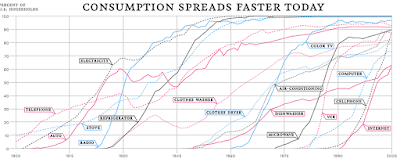Adoption curves are often steeper than you think
When I was younger there were a lot of wondrous devices that were predicted in some science fiction books I read that I thought I might never get to use. For instance when I was reading some Tom Clancy book or other in high school some government servant pulled out his pocket device that combined a cell phone, a GPS, and a PDA. This was of course a super expensive device that was only available to top government officials and the very wealthy. It was, of course, basically an iPhone but with less features. There was another novel I read in college, Snow Crash, where the protagonist managed to get access to a piece of software normally reserved for the rich and powerful. It was a 3D model of the Earth overlaid with satellite imagery that you could manipulate and zoom in on any location smoothly plus a lot of extra information. It was basically Google Earth except with a few more features.
Every technology has an adoption curve. Once indoor plumbing was for the rich only but now it's illegal for even the poorest of us to try to save money by building a house without it, for valid public health reasons. Once TVs, refrigerators, and all sorts of other things were available to the few but eventually ended up with mass adoption. Here's a nice chart courtesy of The Atlantic:
It's not all smooth or even a constant march forward but the trend is clear. Are the slopes steeper more recently? Maybe or maybe that's just an artifact of what technologies the chart maker was aware of.
Whenever I'm in a discussion about some new technology someone always points out that it'll be just for the rich. Often that's true at first. But sometimes, as with the iPhone it only makes sense to build it when a large swath of the moderately well off population can buy it. And sometimes, as with Google Earth, it doesn't make sense to restrict who can use it. But even if it does start off just for the rich even the poor will get to use it eventually. If the materials involved are cheap but the design of it is costly then it'll probably be adopted quickly. Vice versa and maybe the opposite will be true. But it will probably reach wider use eventually and we should only talk about the period where it is the preserve of the wealthy rather than assume that will be the whole of the future.
Every technology has an adoption curve. Once indoor plumbing was for the rich only but now it's illegal for even the poorest of us to try to save money by building a house without it, for valid public health reasons. Once TVs, refrigerators, and all sorts of other things were available to the few but eventually ended up with mass adoption. Here's a nice chart courtesy of The Atlantic:
It's not all smooth or even a constant march forward but the trend is clear. Are the slopes steeper more recently? Maybe or maybe that's just an artifact of what technologies the chart maker was aware of.
Whenever I'm in a discussion about some new technology someone always points out that it'll be just for the rich. Often that's true at first. But sometimes, as with the iPhone it only makes sense to build it when a large swath of the moderately well off population can buy it. And sometimes, as with Google Earth, it doesn't make sense to restrict who can use it. But even if it does start off just for the rich even the poor will get to use it eventually. If the materials involved are cheap but the design of it is costly then it'll probably be adopted quickly. Vice versa and maybe the opposite will be true. But it will probably reach wider use eventually and we should only talk about the period where it is the preserve of the wealthy rather than assume that will be the whole of the future.


Comments
Post a Comment